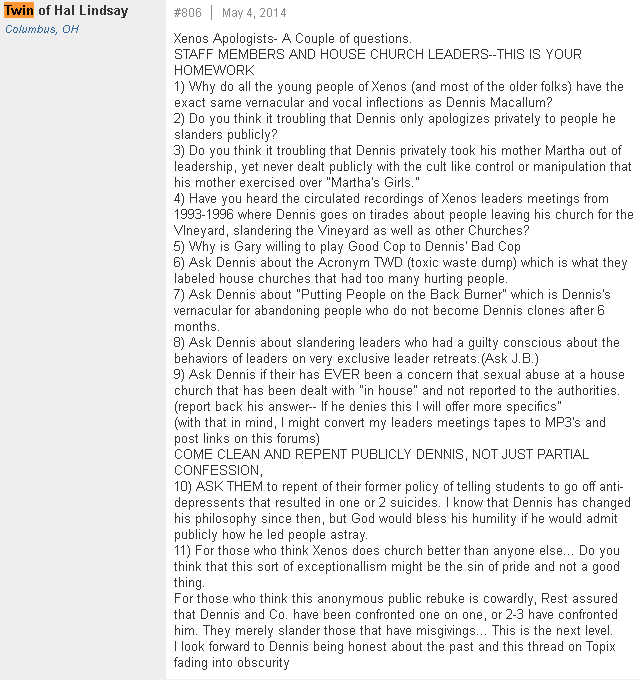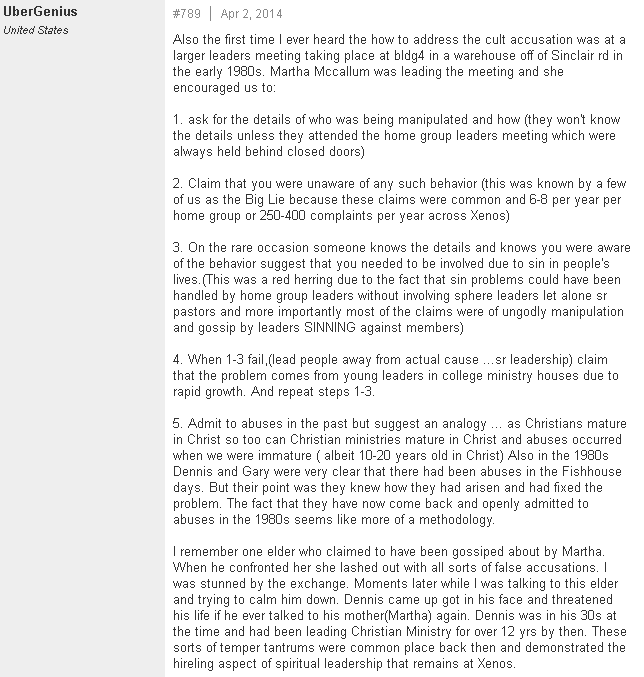Disclaimer: This was an submission by an ex-member, and their words, thoughts and ideas about Xenos:
Hopefully something here is new / helpful. God used the church powerfully in my own life, but the issues I either personally witnessed or uncovered with some studying are too great to justify staying silent about them.
1. Spiritual abuse books happened to be making the rounds through the church during the exact same time that there was "open division" in the church which eventually led to 1,000+ members leaving the church during 1992-1994
I am not aware of the true reasons for the split in the 1990's, but it seems likely that it would have occurred at least partially due to ongoing abuse problems in the church that were finally being called out. I attached several pictures from the topix thread that speak on this possibility.
At a servant team meeting maybe a year or two ago that I attended (servant team is a group of 700 or so established, long-term church workers who have been invited to attend), I remember hearing 1992-1994 referred to as a "time for pruning in the church", but a careful reading of Xenos' annual reports and a couple essays written around the time reveal that the spiritual abuse problem was around then just as it is now, and that those 1,000+ defectors perhaps didn't leave because they decided they didn't want to follow the Lord anymore, but instead because they recognized the abuse for what it was. And, they were probably helped in their decision to leave by the following books, both of which had response papers written by Xenos elders:
I have not read this book, but I certainly relate to all of the quotes from it in the Xenos response. The "vague or general features in the morphology of religious addiction" section should be enough for a discerning (i.e. "woke" to the church culture?) reader to realize that there are deeply concerning issues with the response. Please note how the response is uncompromising, and note how similar it is to the process in the picture I attached about how to systematically respond to the Xenos cult accusation (topix4).
- The Subtle Power of Spiritual Abuse
I've personally read the book above and found that it spoke directly to my growing concerns about the culture of the church, especially the college group. I'd highly recommend it, assuming that it is read as a tool to understand what is happening. Here's a link to the Xenos response paper. As noted in the intro, this book was floating around during 1993 and was apparently well-known in the church at the time.
Below I'll make note of a few papers from the Xenos website that are suspicious.
- Xenos 1994 Annual Report actively rejects the notion of Xenos being a "healing church"
See the final page, Summary & Vision section. I am concerned that this document displays Xenos leadership not only taking claims of abuse lightly, but lowering the status of those who would be bold enough to speak out. Instead of openly admitting fault for protecting a culture that provoked abusive situations, the author writes statements such as "we are not here to please either our own members or those outside the church" ... "we have never viewed our group as a nice place to hang out and raise a family" (duh, nor did I or the numerous others who worked inconceivably hard but have left and are speaking out) ... "we have consciously turned away from [a healing church as the] definition of a church" ... "God has brought you here so that you may take one of the oars and begin to pull" (is the reader supposed to ignore the ongoing deprivation of their own emotional and spiritual health while pulling? I know that I did and paid for it desperately)
- Also, it is worth reading A Vision of Christian Servanthood in which the vision for the servant team is given
Notice how the vision of the church is entirely focused on working harder (and not necessarily in the way that scripture defines work, but instead as Xenos defines work), during a time when abuse concerns are rising, as the church leadership consciously turns away from defining itself as a healing place. This all seems like a recipe for continual disaster. A quick CTRL+F on the document above yields 38 different instances of the word "work", and literally ZERO for "grace", "rest", "joy", and "love". Imagine the danger of a church taking this kind of direction in ~1993, given how much of the "work" we were doing in Xenos was dubious at best, and manipulating and damaging at worst! No surprise that people continue to leave in a state of profound hurt and anger at the Lord.
2. Other documents
Check pages 5 and 6 for a thorough analysis on how, when, and why to share other people's personal matters regardless of whether or not they were told to you on confidence, along with a scriptural arguments for how "discussing others' sins may be necessary for the healthy working of the local church". I find myself disagreeing with a lot of these points now! These kinds of papers are given to college kids in LTC courses, 80% of which were previously unchurched and have no other notion of what good fellowship should be! Young people, who often are just learning about grace and their own capacity for spiritual work, are encouraged to be leaders... told that it is okay for leaders to "confer" with one another as defined in such papers... and effectively given free reign to make gigantic interpersonal mistakes that cause innocent people incredible grief.
- Propositions on Christ, Career, and Culture
I'm super pissed about this one. I remember sitting in LTC listening to a church elder read it point by point, and being too young to understand that I was being subtly led to think that Xenos is the only place for a self-respecting Christian to follow the Lord. From this paper, I developed not only a sense of personal anxiety but also a sense of mistrust for my own parents and their decisions about money and career. Point #26 is especially unbelievable. In #26 the author mindreads highschoolers and assumes that spiritual ones will want to go to Xenos, and tries to qualify the blatant shiestyness of such a claim with weak qualifiers like the phrase "in some cases". And then, follows it up by declaring that any kid who leaves is following two defined patterns! If a teenager isn't able to compose an enlightening and robust plan for ministry at a distant college, but wants to leave Columbus, they are labeled as "never having served God in the first place" and then mocked about their research credibility.
This paper is lowkey sickening, but it is aligned with even worse claims that are made to groups of impressionable and likely confused high schoolers every year during College Connection weekends. The thing that a 19 year old is going to retain subconsciously from this document is: that anyone who would consider leaving Xenos is "in some cases" unspiritual, not a servant, lazy, materialistic, a selfish parent, perhaps even a disgruntled ex-fratboy who misses getting ass and blazin' up in college, and so forth. Who is left to make the decision as to how to respond to the "case" that might arise with a person? Probably an inexperienced, young, misinformed discipler partially motivated by an inner desire to derive significance from making sure their personal ministry has a good social standing among the other church members and is likely to use such material as justification for spiritual abuse? ... (if you'll allow me to mindread and negatively attribute in the way that the paper does)
Young students are often not emotionally or spiritually prepared to make a decision for themselves regarding whether or not an organization making these kinds of claims is being honest with them. Especially given that they are probably unaware about how quickly a decision against the church might lose them the social and spiritual structure they have been living under for their formative years. This is wrong. Encouraging young people to sacrifice mightily to lead under this kind of culture is wrong, and I don't give a shit about how old Timothy was in the New Testament. I also don't give a shit about how you decide to apply the one-another passages. Writing this kind of document and protecting the behavior it develops in the young people in the church is wrong.
Point #31 attempts to step things back a little bit, but the lay leaders we were working to raise up were people who have been absorbing the culture of points #1-30 for years and have no other experience with Christianity or the church at large. Again ... recipe for continual disaster.
- LTC 3 lay counseling document
Wish I had this one, but I deleted my LTC material recently in an effort to distance myself from it all. This document contained statements about the importance of pastoral or professional counseling being more of a last resort, and that lay counseling should be tried first. This was also read out loud to students during an LTC 3 course. What is unfortunate here is that the paper was addressed to Xenos kids instead of psychologists. This kind of paper is what led me, as a 21 year old trying to start a career and lead a ministry house, to not recognize or question the great danger of living with roommates struggling with suicidal depression, spectrum disorder, sleep disorders, dyslexia, and a number of others that we as a leadership team were in no way qualified to handle. My roommates & I all desperately needed professional therapy, but are implicitly discouraged from seeking it out by the church culture.
[Mentioned Images]



